Rhomeians - Scions of the Eternal City
What is there to say about a people that survived the end of the world itself?
Rhomeians are a strange people. Be it war or peace, glory or tragedy, life or death, their reaction will always be a worrying apathy. Passion is something rarely found among them, replaced by a cold, almost inhuman, stoicism. But what could move a people that have seen all there is under the sun in a line unbroken over ten thousand years?
Beyond Ancient
Rhomeians are ancient. Truly ancient. While not the first humans to settle in the lands now called "the Known World", they do trace their origins back to an age long before the Oblivion Hour shook the earth. For anyone else, comments like that would be utter insanity. But not for the Rhomeians. Most aspects of their language, culture, government and worldview are very much the same as they have been nearly ten thousand years ago. And while change is inescapable, the children of the Eternal City have managed to stave it off better than most others.
Imperial Allegiance
One exception to both the caste system and religious order is the Imperial Family. It is in a category of its own, worshipped by all Rhomeians as an epitome of the Eternal Empire's power and history. Having lasted for nearly five thousand years in an unbroken line, or so the Rhomeians like to claim, the family serves as both religious heads and political rulers. How much power they actually wield, however, can vary drastically from age to age.
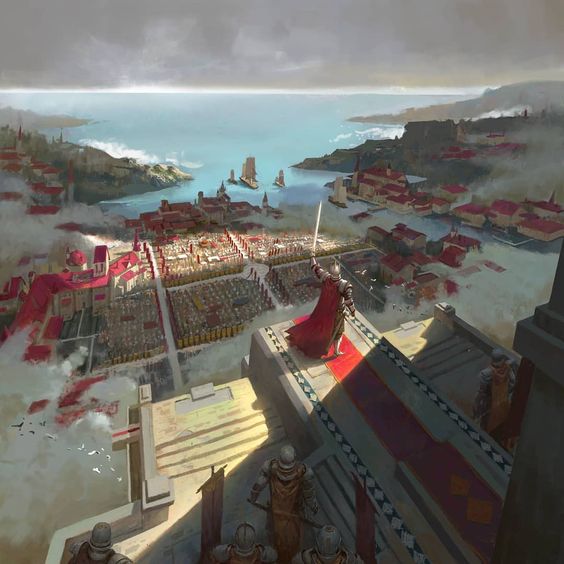 Founded over seven thousand years ago, Rhomeia is the oldest city in the Known World. Together with four other grand civilizations, it laid the foundation for the Golden Age of Mankind and brought humanity to its greatest heights. But war and calamity brought it crashing down and in the end, Rhomeia stood alone.
When the people of the Divide staggered out of the ashes, Rhomeia was there, ancient, advanced and prestigious. Either directly or indirectly, Rhomeia and its empire have heavily influenced almost every culture in the known world. Rhomeia helped to shape the basis for the revival of humanity in a post-Oblivion world.
Its traders and markets brought incentives for local economies. Its rulers showed how to be an autocrat or republican. Its armies and navies told of the possibilities of war. And its riches brought envy and the desire to rival the Eternal City. Not solely responsible, Rhomeia did contribute greatly to the rise of civilization.
There is no clearer example of its influence, however than the descendants of its ancient Empire. Colonies throughout the world, separated from the homeland by the disaster, developed in their own ways. Thus came about the Vardanians, Onadarans and Illigarans, each a group that would shape the future of the world and, in the case of the Vardanians, even surpass Mother Rhomeia herself.
That is not to say that there is no ambition within the Rhomeian system. It is a very present part of the whole, with the difference that it is often sated at the expense of non-Rhomeians rather than the Empire itself.
Founded over seven thousand years ago, Rhomeia is the oldest city in the Known World. Together with four other grand civilizations, it laid the foundation for the Golden Age of Mankind and brought humanity to its greatest heights. But war and calamity brought it crashing down and in the end, Rhomeia stood alone.
When the people of the Divide staggered out of the ashes, Rhomeia was there, ancient, advanced and prestigious. Either directly or indirectly, Rhomeia and its empire have heavily influenced almost every culture in the known world. Rhomeia helped to shape the basis for the revival of humanity in a post-Oblivion world.
Its traders and markets brought incentives for local economies. Its rulers showed how to be an autocrat or republican. Its armies and navies told of the possibilities of war. And its riches brought envy and the desire to rival the Eternal City. Not solely responsible, Rhomeia did contribute greatly to the rise of civilization.
There is no clearer example of its influence, however than the descendants of its ancient Empire. Colonies throughout the world, separated from the homeland by the disaster, developed in their own ways. Thus came about the Vardanians, Onadarans and Illigarans, each a group that would shape the future of the world and, in the case of the Vardanians, even surpass Mother Rhomeia herself.
That is not to say that there is no ambition within the Rhomeian system. It is a very present part of the whole, with the difference that it is often sated at the expense of non-Rhomeians rather than the Empire itself.
Cycle of Decay
This ancient nature affects every aspect of Rhomeian culture and government. Rhomeians are the epitome of the term "arch-conservative". Change, if it occurs at all, must come via violent upsurges. The result is an eternal cycle of periods of stability followed by catastrophic decline.Stratified Society
Rhoemian society operates in a system of casts that has remained unchanged for over four thousand years. Evigenoi, Lerateoi, Emporoi, Stratoi, and Ergatoi form the core five casts. Within each is a complex system of minor casts., whose numbers vary drastically. Membership is determined by birth and can never be changed. Attempting to do so would be met by damnation from one's entire community.
Rhoemian society operates in a system of casts that has remained unchanged for over four thousand years. Evigenoi, Lerateoi, Emporoi, Stratoi, and Ergatoi form the core five casts. Within each is a complex system of minor casts., whose numbers vary drastically. Membership is determined by birth and can never be changed. Attempting to do so would be met by damnation from one's entire community.
Cultural Stagnation
While other cultures change over time, often to accommodate either outside influences or internal developments, Rhomeian culture almost stubbornly refuses to do so. It very much has remained mostly the same as before the Oblivion Hour, being a battlefield of cold ambition and pride unmatched. Outside cultures are at best frowned upon, the word "Barbarian" being a favourite term to describe them.
While other cultures change over time, often to accommodate either outside influences or internal developments, Rhomeian culture almost stubbornly refuses to do so. It very much has remained mostly the same as before the Oblivion Hour, being a battlefield of cold ambition and pride unmatched. Outside cultures are at best frowned upon, the word "Barbarian" being a favourite term to describe them.
Faithful Servants
Faith is one area where Rhomeia shows its stranger side. While the Rhomeian Faith seems, at first glance, like your usual pantheon of gods, there is a noticeable difference in that every Rhomeian only ever worships one of its deities. There is only ever one god, with the other members degraded to mere agents. Each god has a dedicated and fiercely combative cult and some claim that Rhomeia is caught in an eternal holy war.
Faith is one area where Rhomeia shows its stranger side. While the Rhomeian Faith seems, at first glance, like your usual pantheon of gods, there is a noticeable difference in that every Rhomeian only ever worships one of its deities. There is only ever one god, with the other members degraded to mere agents. Each god has a dedicated and fiercely combative cult and some claim that Rhomeia is caught in an eternal holy war.
Rhomeia, Mother of the World

by 王 建喜
Superior State
One particular area of Rhomeian culture is their political system and methods of governance. Its convoluted and often contradictory nature has served as inspiration for many different systems and movements throughout the world. Naturally, the only true way to successfully govern your realm is that employed by the Rhomeians themselves.Power of the Monarch
At the core of the Rhomeian system is the Emperor and his family. Power rests solely in their hands, is divinely sanctioned and only temporarily given to others, so they may serve as agents of imperial will. Rhomeia's rulers are the most autocratic in the world and their example has inspired many an absolute monarchy and theocracy. The unquestioning loyalty and worship with which Rhomeians regard the Imperial Family, however, is not often replicated.
At the core of the Rhomeian system is the Emperor and his family. Power rests solely in their hands, is divinely sanctioned and only temporarily given to others, so they may serve as agents of imperial will. Rhomeia's rulers are the most autocratic in the world and their example has inspired many an absolute monarchy and theocracy. The unquestioning loyalty and worship with which Rhomeians regard the Imperial Family, however, is not often replicated.
Republican Virtue
Utterly opposed to the principles of Rhomeian autocracy is its democratic tradition. Elections and popular votes have a long tradition and most minor positions are given out via vote. Unlike Vardanians or Themyrans, Rhomeians have never established a full-on republic or even tolerated measures that would threaten the position of their monarchy. Another difference is that Rhomeians see their offices as a solemn duty rather than a chance to gain power.
Utterly opposed to the principles of Rhomeian autocracy is its democratic tradition. Elections and popular votes have a long tradition and most minor positions are given out via vote. Unlike Vardanians or Themyrans, Rhomeians have never established a full-on republic or even tolerated measures that would threaten the position of their monarchy. Another difference is that Rhomeians see their offices as a solemn duty rather than a chance to gain power.
Oh Death
Last but certainly not least is the Rhomeian obsession with death. As does every other culture that has survived Oblivion in one form or another, the Rhomeians deal with death in a way that may seem strange to those not hailing from the Divide. Vardanians honour it, Sekarans and Illigarans obsess over it and Rhomeians simply ignore it. To them, death is nothing special. A precious person is not mourned but stoically seen off. The bodies of the dead are not buried but burned and their ashes used for other products such as fertilizer. To a Rhomeian, focusing on death is a distraction from life. And when your whole world can burn from one moment to another, every lived moment counts.To some, death is a tragedy. To others, a mere statistic. To Rhomeians, it is nothing.
Related Organizations
Related Myths
Related Locations
The many colonies that Rhomeia left behind have developed rather distinctly. Some perished and were forgotten. For others, their ruins served as the basis for new societies to build on. Some survived like Rhomeia and then returned to her fold. Others resisted and fought her. Throughout the Dawn Age, Rhomeia has had a complicated relationship with its many colonies, especially in Vardania.
There, the great city of Tarquinnia rose to create an empire to rival the Rhomeia of old. Others, like Methlan, have stayed by their mother's side and helped retain the Eternal Empire. In the 27th Century, they even intervened to save the mother city from a suicidal civil war and managed to restore it to some measure of pride and power.
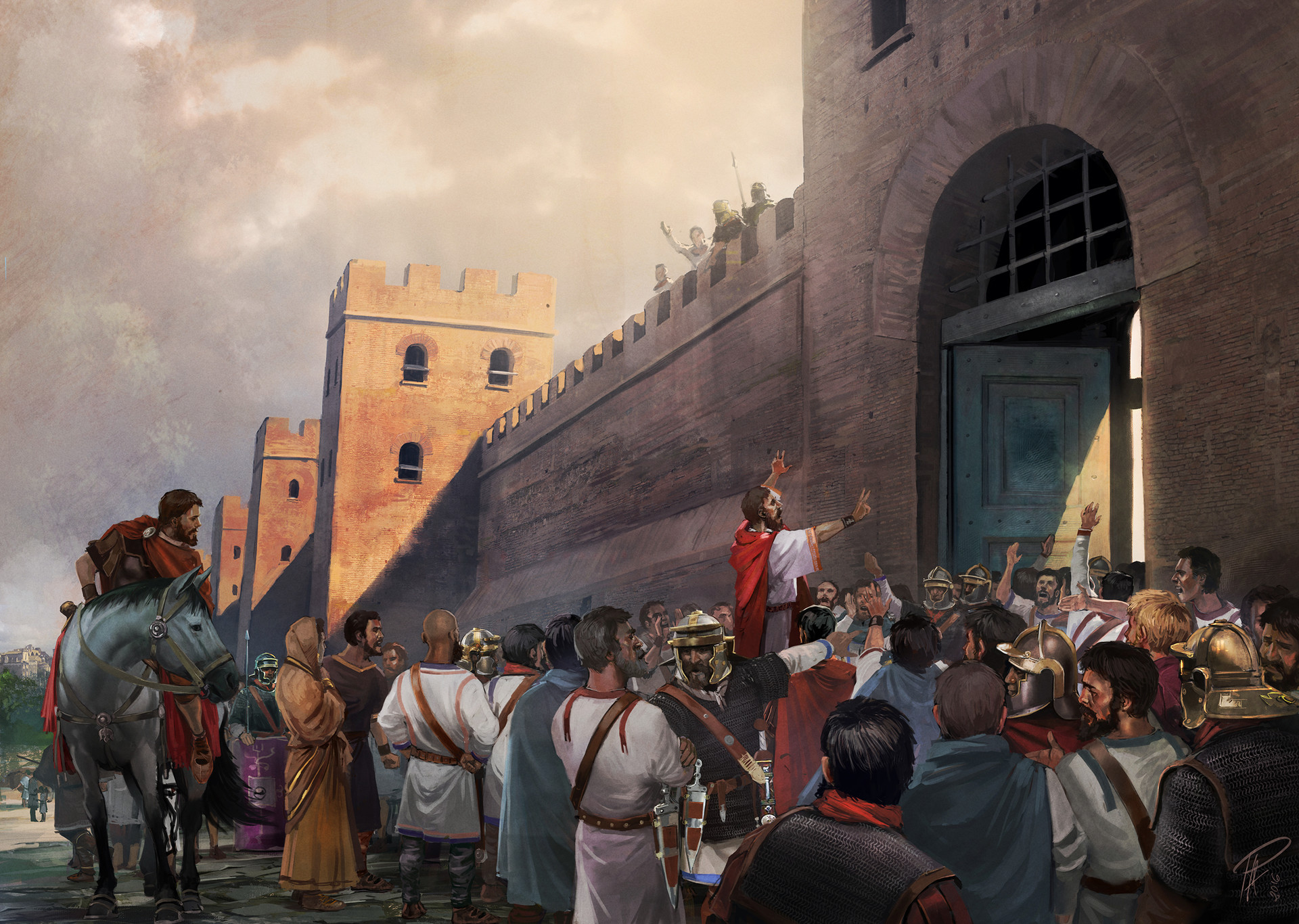 Progress via Remembrance
Once, Rhomeia was the most advanced power in the world. But that is an age long gone. Nevertheless, many scriptures and secrets have survived the calamity and sit in archives, ready to be rediscovered. Technological progress is made most often when such ancient secrets are unearthed and Rhomeia fiercely seeks out any piece of information that may hail from the ancient past. Force is often the prefered method, either implied or actually used. Few would dare to resist one of the most advanced armies in the world, after all.
Progress via Remembrance
Once, Rhomeia was the most advanced power in the world. But that is an age long gone. Nevertheless, many scriptures and secrets have survived the calamity and sit in archives, ready to be rediscovered. Technological progress is made most often when such ancient secrets are unearthed and Rhomeia fiercely seeks out any piece of information that may hail from the ancient past. Force is often the prefered method, either implied or actually used. Few would dare to resist one of the most advanced armies in the world, after all.
Have you ever seen a people that would send an army to gather some books? We Rhomeians know no other way.A People of Dark Disposition Rhomeians are not the most friendly of people in terms of looks. Dark hair and grim faces are the norm. Especially the sharp edges of their faces, somewhat hawkish noses and iron eyes serve to create the impression of a people that, even in the best of cases, would not treat you with much friendliness. Their skin tone varies from slightly tanned to light brown but is slightly offset by their strong body hair, which makes them look darker at first glance. Eye and hair colour does not vary much. Green and brown eyes dominate, blue being a rare sight, and while brown or black hair tones are abundant, one would have to search endlessly for a natural blonde or redhead.

by Ramon Acedo
Remove these ads. Join the Worldbuilders Guild

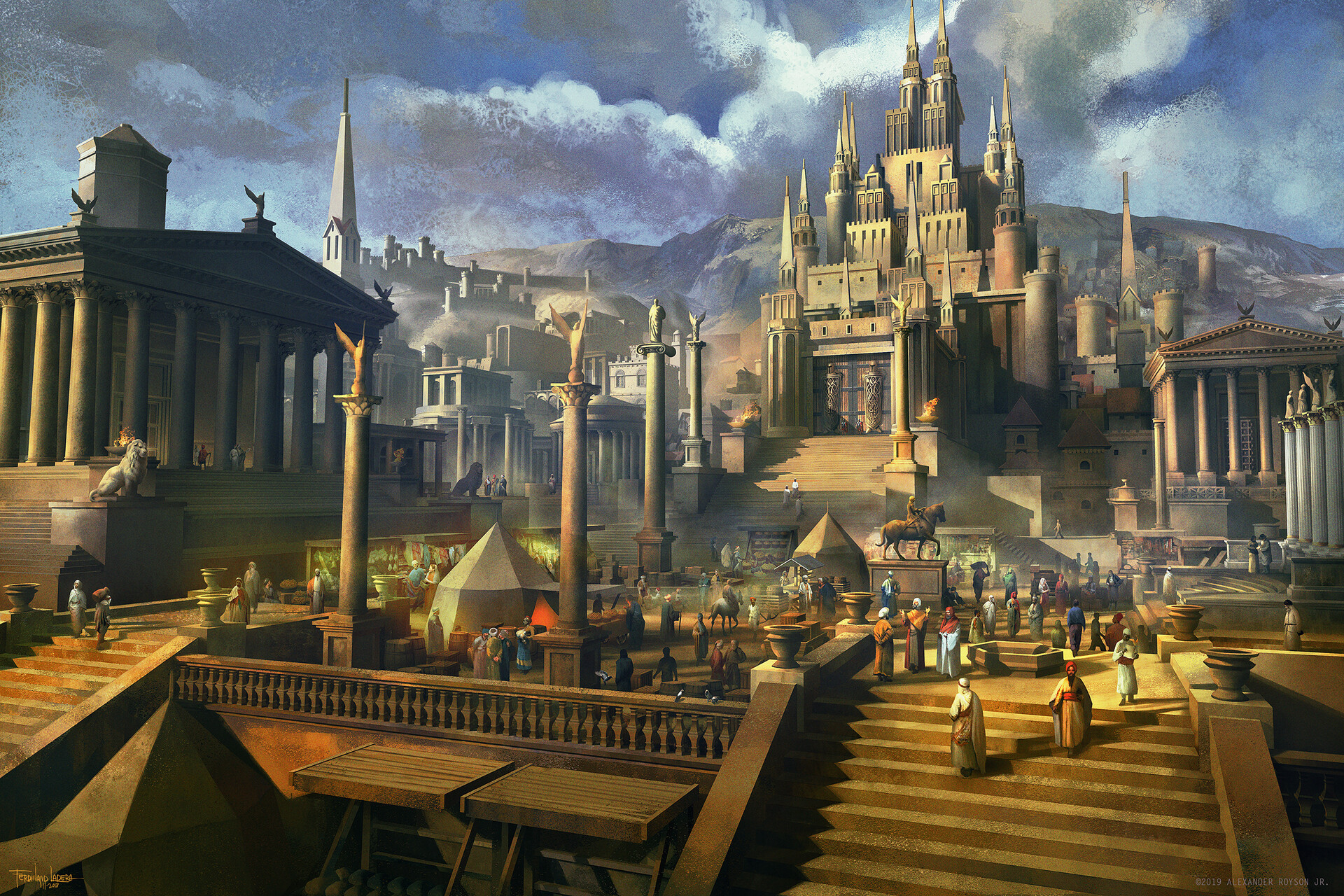
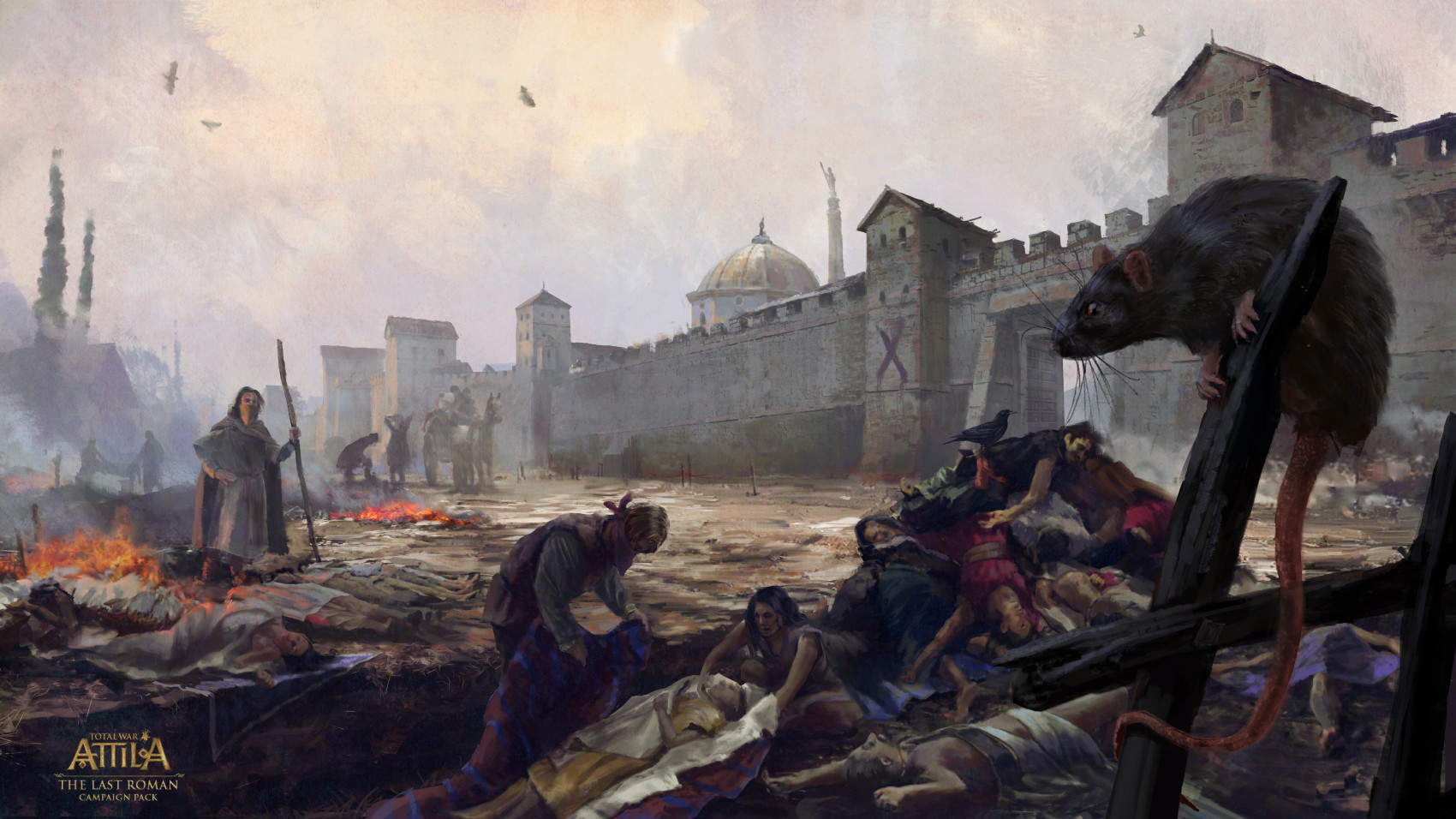
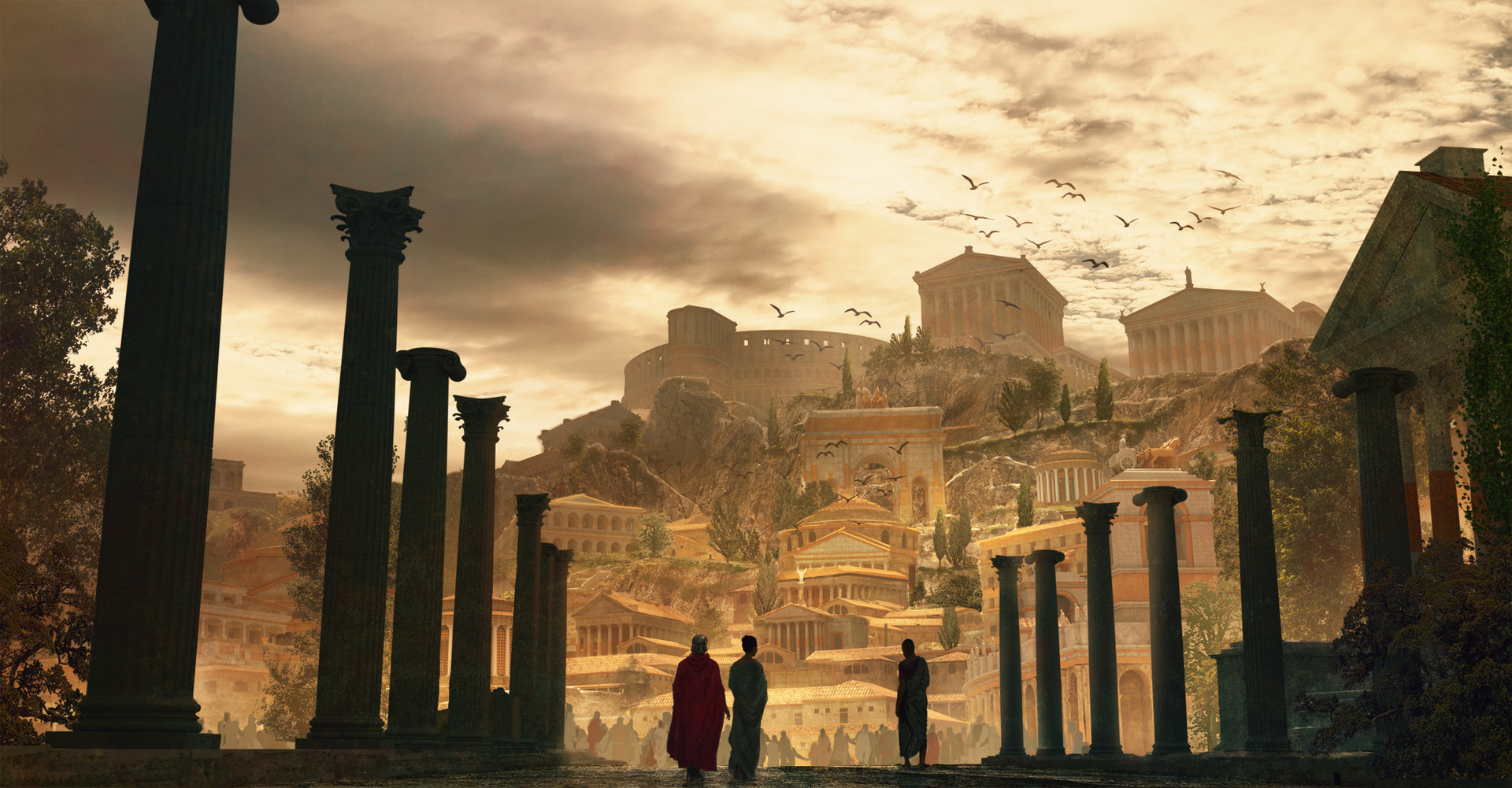
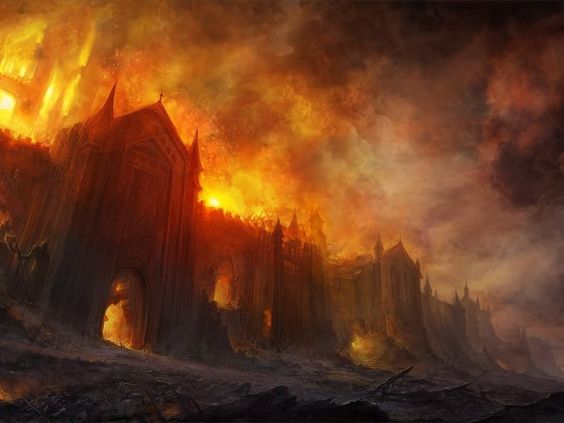

I love how you use the page and use quotes to help space things out. You also strike a really good tone right away; I feel a depth of history all the way through here. Very cool!